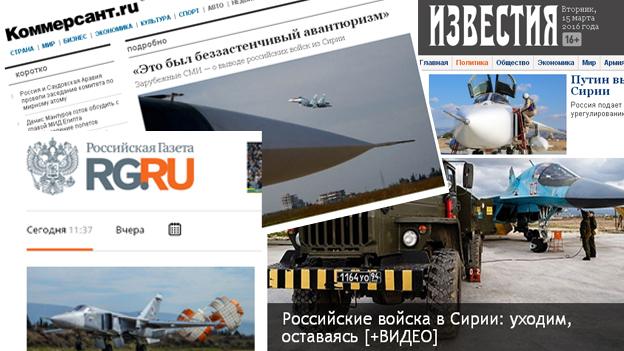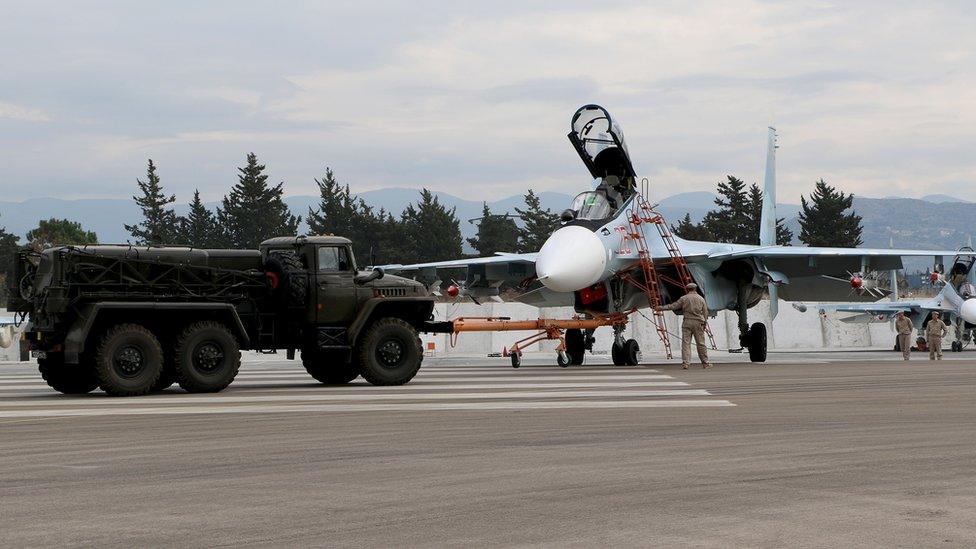Russian media put positive spin on withdrawal from Syria
- Published

Russian papers reported favourably on the announcement of the withdrawal
Russian media commentators hail the announced partial withdrawal of Russian forces from Syria, with one saying Moscow has every right to speak of victory.
Syrian media present the withdrawal as a result of an agreement between Damascus and Moscow.
Some Middle East media, however, refer to differences between Syria and Russia.
State-controlled Rossiya 24 TV, external reports that the Russian operation's "result speaks for itself", having allowed Moscow to "recapture the diplomatic initiative by dealing a colossal blow to international terrorism and returning to the Middle East as an independent and firm player".
A report in business daily Kommersant, external says Moscow has every right to speak of victory.
"The main... outcome of the operation in Syria is the resumption of intensive dialogue between the country's leadership and world leaders," it says, external.
Quoting foreign policy analyst Andrei Sushentsov, the pro-Kremlin daily Izvestia, external says this is a "political signal aimed at showing that Russia supports the peace process and is limiting its presence in the region".

Russian planes have carried out thousands of air strikes in support of the Syrian government over the past few months
Analyst Ruslan Pukhov tells the Vedomosti, external business daily that, after it became clear that Moscow was unable to improve relations with the West through joint action against Islamic State, it adopted a more narrow dual goal of stabilising the Syrian regime and launching a peace process, which has now been achieved.
Analyst Andrei Kortunov, also quoted in Vedomosti, external, says the withdrawal is officially the result of a Russian-Syrian agreement, but adds that it cannot be ruled out that Syrian President Bashar Assad "turned out to be too stubborn" and "put the resumption of the Geneva peace process at risk".
Syrian media say the withdrawal is the result of a "Syrian-Russian agreement".
Syrian state TV channels framed the news as a Syrian-Russian "agreement", reached during a telephone call between the two presidents, to "reduce" the numbers of the Russian air force in Syria in the light of the improved situation on the ground.
Presenters read out a statement posted on the Syrian presidency's Facebook page which said the decision had involved "complete co-ordination" and had been studied "carefully and in detail for some time".
The channels also broadcast a statement from the Syrian armed forces command which said the agreement was "natural" given the "great successes" achieved in the war against terrorism.
Guest analysts on the channels described the announcement as an "expected" move. They stressed that some Russian forces would be remaining in Syria and they pointed out that the two sides had reiterated their commitment jointly to fight against terrorism.
Commentator Bassam Hashim in Al-Baath, external, the mouthpiece of Syria's ruling party, describes the withdrawal as "an expected surprise" that "turned the tables on the malicious wishes of more than one party and brought the plans of some others back to square one".
The Iranian regional Arabic-language TV channel Al-Alam reports that the Russian withdrawal was the result of negotiations with the Syrian president, and says there is "no truth to rumours of differences between the Russian and Syrian presidents".
Ali Hamadah in private Lebanon-based newspaper Al-Nahar, external, which is against President Assad, argues that Russia has achieved its goals.
"There is no credible information on what lies behind the timing of this announcement but lately there have been signs of discord between the visions of the Russians on one hand, and the Assad regime and the Iranians on the other," he says.
BBC Monitoring reports and analyses news from TV, radio, web and print media around the world. You can follow BBC Monitoring on Twitter, external and Facebook, external.